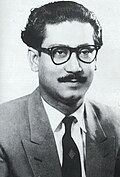This article has multiple issues. Please help improve it or discuss these issues on the talk page . (Learn how and when to remove these messages)
|
| National Mourning Day | |
|---|---|
 Flag of Bangladesh at half-mast on the day | |
| Also called | জাতীয় শোক দিবস |
| Observed by | Bangladesh |
| Liturgical color | Black |
| Significance | To honour the people died during Assassination of Sheikh Mujibur Rahman |
| Date | 15 August |
| First time | 1976 1996 (Officially) |
National Mourning Day of Bangladesh was a public holiday in Bangladesh, commemorations began in 1976. [1] [2] Before 2024, on 15 August of every year, the day was observed officially and nationally. [3] [4] [5] [6]


